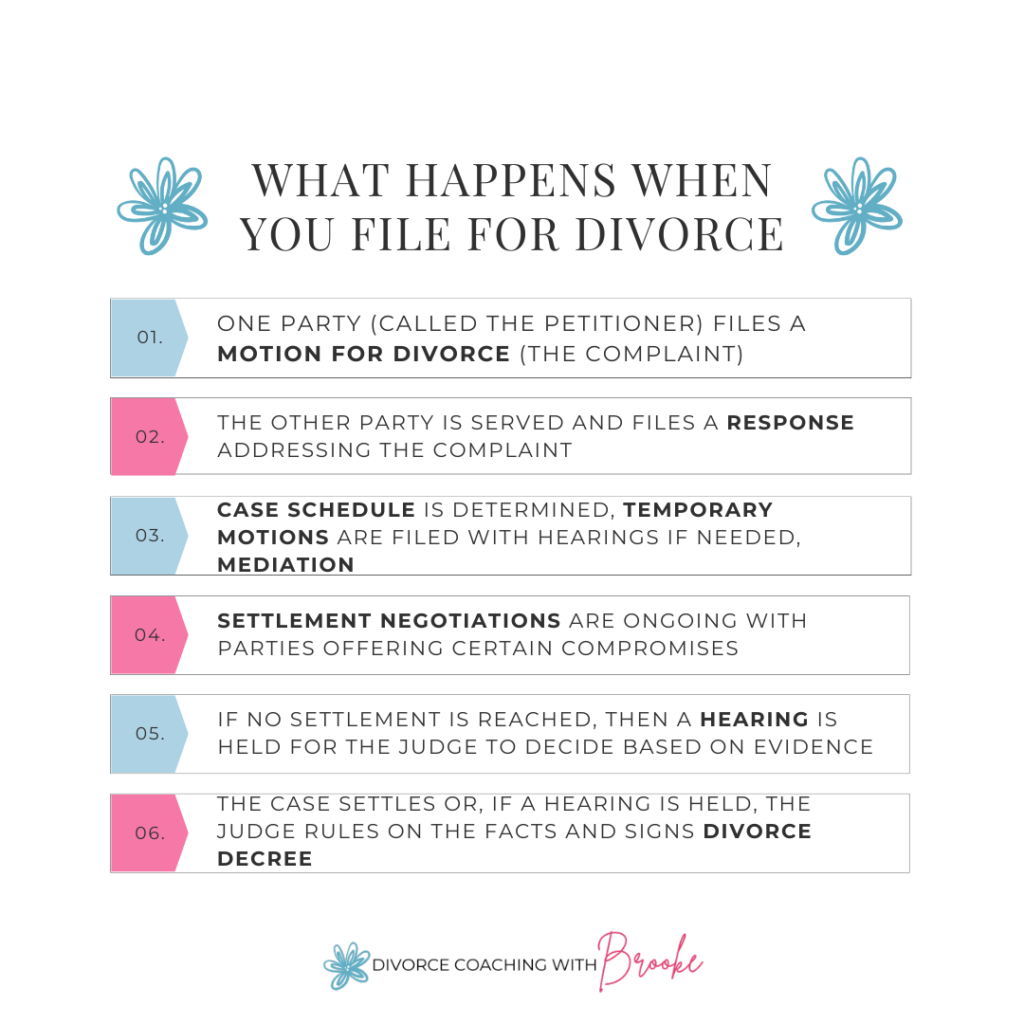
What are the steps for filing for divorce?
Everything I knew about divorce I learned on bad TV! That’s mostly true. I also knew about divorce having grown up in a home with divorced parents. I lived with my mom in the school year and my adopted dad in the summer. Divorce is so much more complicated than that, especially if you are married to someone with a high conflict personality.
After I asked for my divorce, I walked into an attorney’s office thinking that they would tell me what to do. Instead, they waited for me to tell them. But I knew NOTHING about how the system worked. I was relying on the attorney to tell me how to proceed. And honestly, I thought I would share the timeline of abuse, manipulation, and threats, and he would rush into action to protect me and the kids.
Instead, he told me that I needed to “give X a chance to be a dad.” What?! I had given him a chance to be a dad. He sucked at it. And then he had threatened to kill me. Surely, we weren’t going to send the kids off unsupervised with this unstable person.
But that’s what happened. That’s what the courts told me was normal. That is the system we have created.
So for those new to divorce or considering separation and divorce, here is a little primer on how the process goes. Disclaimer: I am not a lawyer. I am a protective mom who has walked through the process and helps other protective moms. Questions about the specifics of your legal case should be run through your attorney.
 What happens after I say I want a divorce?
What happens after I say I want a divorce?
After you tell your partner that you want a divorce (or after they tell you they want a divorce), one party typically moves out of the marital home. This has changed some in the last several years with both parties continuing to live together. In high conflict cases where there is alleged abuse, this is probably not the best option for your mental health, but I understand why some people do this. If you have filed an order of protection, the terms of the separation and contact will be a little different and will be addressed in another post.
There are several ways to go through the divorce:
- With an attorney – This is a pretty standard route. One or both parties hire an attorney who are able to file motions and requests for orders on your behalf. You can also have an attorney draft an agreement that you both end up signing and filing with the court (this is what I did, but X is unique in not fighting for custody initially).
- Through a collaborative divorce – If you are on good terms with your partner, there are options for collaborative divorces where you work together to create an agreement. This is not typically possible with the clients I work with.
- Mediation – You can also hire a mediator to help you come to an agreement that you file with the court. As with collaborative divorces, this is difficult for clients who have personality disordered or abusive spouses.
In some states (Virginia for example), parties are required to be separated for a year prior to filing for divorce (yay antiquated laws that force moral judgement and marriage on people). If you have an abusive partner, this year can be full of love bombing to try to get you to reconsider. It is important for you to educate yourself on controlling behaviors and the abuse cycle in order to protect yourself during this time!
Depending on how your partner views this process as well as their desire to create chaos and conflict, even getting a separation agreement can be challenging. But, if you can get one, it can lay out a plan for temporary custody while the divorce is ongoing as well as define living arrangements, financial obligations, and debt. Anything that may be addressed in the final court order for the divorce can basically be addressed in the separation agreement (and then later, the parties can use that agreement as the basis for the divorce, again depending on the parties’ states of mind).
The legal divorce process
So, you’ve decided to divorce. One of you has moved out. You’ve consulted an attorney. Now what?
Filing for Divorce
Your attorney will draft a complaint essentially that lays out the facts that are relevant for the divorce. Things that might be included in the filing:
- Finances
- Current living situation
- Length of marriage
- Names, DOB of children
- Assets, including homes
- Debts, including cars and credit cards
- Date of separation
- Circumstances around the reason for the separation depending on how the state views divorce and whether it’s a no-fault state
- Allegations of abuse
The complaint will also ask for relief. This is where you need to be specific with your attorney about what you want. Even if it is a default 50/50 state, you can ask for something else and tell your attorney to fight for that arrangement. No, you might not get it, but you are the client and can tell your attorney what matters to you. Relief might include:
- Custodial time
- Holiday visits
- Legal custody (please ask for tie breaking decision authority on educational and medical decisions)
- School placement
- Health insurance
- Debt responsibility
- Asset allocation
- Alimony
- Child Support
If there is no separation agreement and no stipulated agreement – an agreement both parties agree to and file with the court, then one party can file for temporary custody orders. If there is a belief that the child(ren) are at risk, you can file for an emergency custody hearing, but you must be able to show that there is the possibility of harm. If you believe your children are in harm but your attorney is shrugging, remember that you are the client and can tell your attorney to file an emergency motion. Again, it might get denied, but it won’t be you sending your child into harm’s way. The court can’t later blame you for the visit (not that the court will take responsibility either).
Temporary custody orders are specific to custody and set out the terms of custody and visitation while other matters and the divorce are being decided. You will have a hearing on the motion that is filed (that will again contain facts supporting the desired relief and the custody schedule you believe is best for your children). This hearing will be much shorter than the eventual divorce, but you will likely still present some evidence about why you are asking for less than 50/50. Many times, these requests for temporary orders also include an affidavit, declaration, or certification. My affidavits often were a couple of pages long and read something like:
- I am the mother of CHILD 1 and CHILD 2.
- Our current custody schedule provides for once a month overnight visits to be scheduled by X with seven days notice.
- Since our separation on DATE, X had not taken any of his provided overnights.
- On DATE, a year later, X asked for his first overnight.
- At the exchange for that overnight, CHILD 2 expressed concern over the visit and then vomited in the parking lot.
For this example, I would have asked for overnights to be suspended until a final hearing. In the affidavit, you only want to include facts, not emotions.
In most cases, a judge will order both parties to mediation. They do not want to hear these cases and believe that everyone is sane and healthy and should be able to come to an agreement. Obviously, we know that isn’t true. But, they will send you off to a mediator anyway to try to get you to some agreement. Usually, this means that the victim of abuse gives in to the demands of an abuser or ends in mediation breakdown. But, you *can* negotiate with a narcissist, no matter what anyone tells you.
Scheduling and Status Hearings
After you have filed for divorce, the other party will have a chance to answer that claim. Then the judge will hold a scheduling conference with both attorneys (or representatives from both sides). They will schedule the final hearing as well as deadlines and status hearings along the way. The status hearing can be an update after mediation or can be closer to the actual hearing once the attorneys have submitted their theories of the case. A lot of these hearings are again intended to get you to settle.
You will be asked to provide evidence in the form of discovery for your claims in the complaint that is filed. Evidence can be text, photos, emails, therapy notes, report cards, medical notes, audio files etc. This has to be provided to the other party. They will also send you a list of items that they want you to provide, which can include emails, texts to other people (including your friends and parents), social media posts, etc. You will also help your attorney come up with a list of items to request from your ex that you want to look through that you think will help build your case. Remember, anything in writing that isn’t communication with your attorney can be discoverable. You will also send a list of questions – and be sent a list of questions – to answer for the other side.
Depositions
Depositions are often scheduled as a way to get additional information from the other side prior to court. During a deposition, you are sworn in just like you would be in court. Transcripts from the depositions can then be entered into evidence during the hearing.
The hearing
You will finally have a hearing after what feels like 17,000 years. This is when you will present your evidence. You will likely be called to testify as will your ex. You will be cross examined by the other side, who will likely not treat you nicely. You would also call any witnesses, forensic accountants, forensic psychologists, or expert witnesses to bolster your case.
Final Order/Divorce Decree
After your hearing, the judge will likely issue a document called “Facts and Findings” where they assert what is true about your case. This document can be enraging if you know that your ex lied, and your judge writes it as truth in the facts and findings, which is an official court record. My judge called me controlling for asking X to adhere to the court order and to use bug spray when he is very allergic to mosquitoes. It’s been years, and I still won’t read the entire document!
The final order will spell out the details of your divorce, but more specifically, the details regarding custody. This will become your guiding document and the rules that you live under for better or worse until the kid ages out of the system or you file for a modification.
